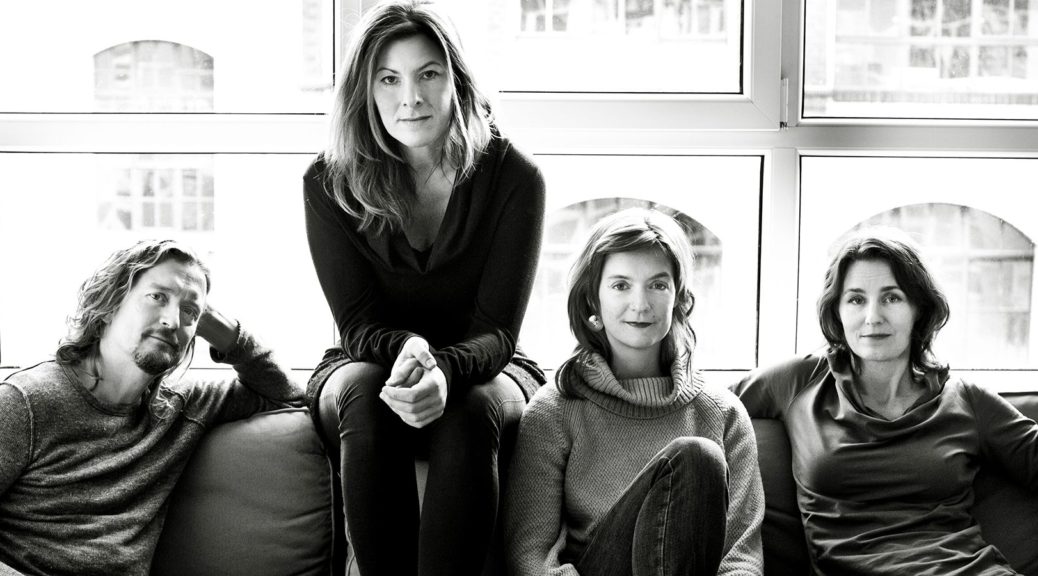
Celebrating Beethoven’s 250th
If you think of Ludwig van Beethoven mostly as the Ninth Symphony and the dih-dih-dih-DAH Fifth, I propose your spending his epic 250th anniversary these days by looking at him as the audacious innovator, many decades ahead of his times, as reflected in his late string quartets. He had been many things to many people: a feminist (in “Fidelio”), a freedom fighter battling oppression (“Egmont”), a master reformulator of the piano, and an unprecedented purveyor of high drama in music (Third Symphony, “Coriolanus,” “Leonore Overture”).
But his late string quartets intersect with another realm, of deep introspection, innovation, abrupt mood shifts and reshuffled movement sequences. And one of the most eloquent interpretations ever has come, just as incredibly, from a parttime ensemble, the German Tetzlaff String Quartet, streaming virtually on Cal Performances through Jan. 6.
This includes the “Grosse Fuge” (Great Fugue), a movement so herculean that it had to be detached from the Op. 130 Quartet. This fugue is a wild ride that will have you fastening your seat belt. The dynamic and the tempo are constantly shifting in Beethoven‘s amiable (but carefully programmed) chaos of invincible momentum. In their interview, the Tetzlaff players point out that Beethoven never indicates which player is to be at the forefront at any given time, forcing interpretive decision-making. Furthermore, they note that to play different passages of it, they must use different grips on the bows.
The same “shifting sands” approach of the Tetzlaff enriches the strong performance of the Op. 132 Quartet, a personal favorite. Unlike most of today’s quartet that play with predictable regularity, the Tetzlaff inserts a seductive rubato (tempo shift) throughout, and constantly altering, louder-softer gradations, as if having dissected and rethought each measure of the long work in rehearsal. The marvel of it all is that the Tetzlaff group——-leader Christian T., his wife Tanja at cello, and two German colleagues—spend only three weeks a year at their joint enterprise, each pursuing some mainline career separately the rest of the year. Their interplay is dazzling and imaginative.
The virtual concert (recorded in Berlin months ago) also features the composer’s String Quartet Op. 130, which is another of his profound knot of late late SQ opuses with unusual musical connections, akin to tree roots interacting and communicating with one another under the forest.
Looking beyond Beethoven, you might check out other string-quartet riches now offered at Cal Performances, including the Dover Quartet from the Curtis Institute of Music. (Wherever possible, we’ll minimize confusion from the duality of “string quartet,” universally used both as music title and ensemble name.) Dover’s current streaming offers a novelty, Gyorgy Ligeti’s String Quartet No. 1, “Metamorphoses nocturnes.” Ligeti was also an innovator, best known for his score used in the movie “2001.” His stormy life span survived both the Holocaust as well as Hungarian Communism, not opening up fully till escaping westward in 1956 and then confining the storms to his bold compositions.
In this selection, Ligeti (1923-1986) leads off very simply with chromatic scales: G–A–G-sharp–A-sharp, on the first violin. Ligeti scholar Bianca Ţiplea Temeș has traced this idea back to a piano piece by Bela Bartók, who had been a recurrent inspiration for Ligeti.
Listening to classical radio, I had long since concluded that Dvorak wrote only one string quartet, the so-called “American,” broadcast many many times. But here Dover puts forth the next (and penultimate) one, No. 13, which is traditional and expressive despite never having a US visa.
The youthful group, now less than 10 years old, is led by first violinist Joel Link. And if you’re bothered by the distracting facial expressions of the players in the Dover ensemble’s closeups, just capture the audio, not video.
STRING QUARTETS, two separate concerts by the Tetzlaff and the Dover ensembles, virtual streaming on Cal Performances, Berkeley.